备战2013四级阅读练习:日有所思夜有所梦让你更聪明
- 格式:doc
- 大小:57.00 KB
- 文档页数:2
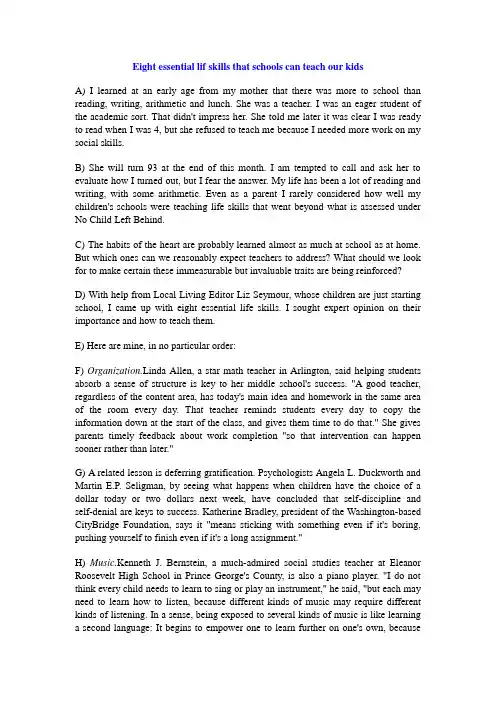
Eight essential lif skills that schools can teach our kidsA) I learned at an early age from my mother that there was more to school than reading, writing, arithmetic and lunch. She was a teacher. I was an eager student of the academic sort. That didn't impress her. She told me later it was clear I was ready to read when I was 4, but she refused to teach me because I needed more work on my social skills.B) She will turn 93 at the end of this month. I am tempted to call and ask her to evaluate how I turned out, but I fear the answer. My life has been a lot of reading and writing, with some arithmetic. Even as a parent I rarely considered how well my children's schools were teaching life skills that went beyond what is assessed under No Child Left Behind.C) The habits of the heart are probably learned almost as much at school as at home. But which ones can we reasonably expect teachers to address? What should we look for to make certain these immeasurable but invaluable traits are being reinforced?D) With help from Local Living Editor Liz Seymour, whose children are just starting school, I came up with eight essential life skills. I sought expert opinion on their importance and how to teach them.E) Here are mine, in no particular order:F) Organization.Linda Allen, a star math teacher in Arlington, said helping students absorb a sense of structure is key to her middle school's success. "A good teacher, regardless of the content area, has today's main idea and homework in the same area of the room every day. That teacher reminds students every day to copy the information down at the start of the class, and gives them time to do that." She gives parents timely feedback about work completion "so that intervention can happen sooner rather than later."G) A related lesson is deferring gratification. Psychologists Angela L. Duckworth and Martin E.P. Seligman, by seeing what happens when children have the choice of a dollar today or two dollars next week, have concluded that self-discipline and self-denial are keys to success. Katherine Bradley, president of the Washington-based CityBridge Foundation, says it "means sticking with something even if it's boring, pushing yourself to finish even if it's a long assignment."H) Music.Kenneth J. Bernstein, a much-admired social studies teacher at Eleanor Roosevelt High School in Prince George's County, is also a piano player. "I do not think every child needs to learn to sing or play an instrument," he said, "but each may need to learn how to listen, because different kinds of music may require different kinds of listening. In a sense, being exposed to several kinds of music is like learning a second language: It begins to empower one to learn further on one's own, becauseone has gone beyond the limitations of what one grows up with."I) Allen said students should also learn how to be a good audience. "If a child can hold it together in the company of hundreds of their peers, they can hold it together for any event," she said.J) Teamwork.Games aren't the only way to learn how to cooperate with others toward a shared goal, but for many students such contests have lifelong importance. Frazier O'Leary teaches Advanced Placement English, one of the toughest courses at Cardozo High School in the District; he is also the baseball coach. "Sometimes it is hard for high school students to understand the value of working together until they grow up and realize that teamwork is essential to success," he said.K) Exercise.Sarah Melanie Fine, a writer, went for a run every morning when she was teaching in a D.C. school. She needed the exercise to survive tough days. Her students often did not have the same chance. "Particularly in an environment where seat time is the ever-growing end-all, kids desperately need time where they're using their bodies and learning a different kind of discipline," she said. Not only does it relieve stress, but it clears the head for dividing fractions, declining nouns and other feats of concentration.L) Friendship.Mike Feinberg, co-founder of the Knowledge Is Power Program charter schools, which emphasize character, said an essential ingredient of learning to be a friend is what some call social intelligence or emotional intelligence. It includes "not giving in to peer pressure, becoming self-aware and using that self-awareness to self-adjust as necessary," he said. He acknowledges that many people think this is something parents should teach, but sometimes they don't, and students' futures depend on it.M) Arguing.Bernstein has a favorite trick for teaching this correctly: "I remember once asking students to prepare a debate, three for the affirmative and three for the negative. When they came into class and I checked that they were prepared, I made them argue the other side, not the one they had prepared. With the exception of the class president, who as a politician did not trust me and thus had prepared both sides, they flopped. And in that failure they learned an important lesson: One is far more effective in debate and discourse when one has thought through both sides of an argument."N) Thinking critically.I remember that my favorite teacher when I was in high school, Al Ladendorff, encouraged our American history class to criticize the textbook. I wondered: Was that legal? Much later I realized the contrarian habits he taught were vital. I am a better writer, a better voter and a better parent for learning to examine popular assumptions and judge if they are correct.O).Presentation."In learning to make a persuasive argument, one has to learn how toaddress an audience," Bernstein said, "be it one person or a large group." As adults we often learn the hard way how important it is to be prepared, maintain eye contact and dress appropriately for the situation. It is better to learn this in school than while shaking in fear two minutes before our first job interview.翻译:A)我学会了从我妈妈在很小的时候,有更多的学校比阅读、写作、算术和午餐。
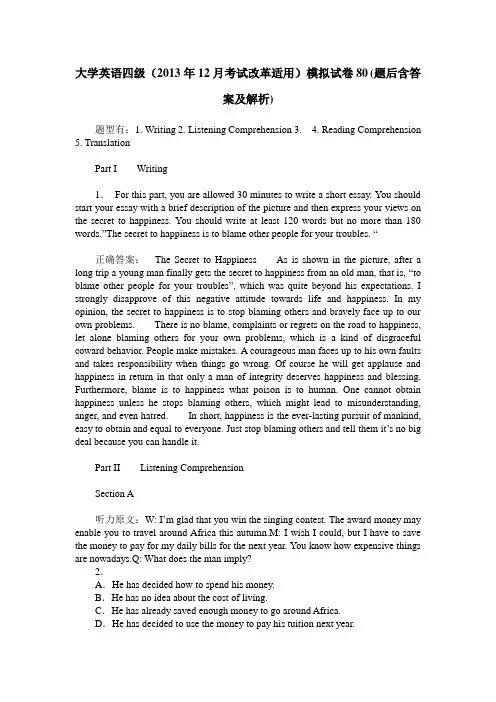
大学英语四级(2013年12月考试改革适用)模拟试卷80(题后含答案及解析)题型有:1. Writing 2. Listening Comprehension 3. 4. Reading Comprehension 5. TranslationPart I Writing1.For this part, you are allowed 30 minutes to write a short essay. You should start your essay with a brief description of the picture and then express your views on the secret to happiness. You should write at least 120 words but no more than 180 words.”The secret to happiness is to blame other people for your troubles. “正确答案:The Secret to Happiness As is shown in the picture, after a long trip a young man finally gets the secret to happiness from an old man, that is, “to blame other people for your troubles”, which was quite beyond his expectations. I strongly disapprove of this negative attitude towards life and happiness. In my opinion, the secret to happiness is to stop blaming others and bravely face up to our own problems. There is no blame, complaints or regrets on the road to happiness, let alone blaming others for your own problems, which is a kind of disgraceful coward behavior. People make mistakes. A courageous man faces up to his own faults and takes responsibility when things go wrong. Of course he will get applause and happiness in return in that only a man of integrity deserves happiness and blessing. Furthermore, blame is to happiness what poison is to human. One cannot obtain happiness unless he stops blaming others, which might lead to misunderstanding, anger, and even hatred. In short, happiness is the ever-lasting pursuit of mankind, easy to obtain and equal to everyone. Just stop blaming others and tell them it’s no big deal because you can handle it.Part II Listening ComprehensionSection A听力原文:W: I’m glad that you win the singing contest. The award money may enable you to travel around Africa this autumn.M: I wish I could, but I have to save the money to pay for my daily bills for the next year. You know how expensive things are nowadays.Q: What does the man imply?2.A.He has decided how to spend his money.B.He has no idea about the cost of living.C.He has already saved enough money to go around Africa.D.He has decided to use the money to pay his tuition next year.正确答案:A解析:女士提到男士在歌唱比赛中获胜所得的奖金可以供他今年秋天周游非洲了,男士则说他必须把钱省下来作为明年的生活费用,因为现在的生活成本太高了。

『高考语文·评估精练』『分项解析·逐一击破』备战2021年高考晨读晚练日日淘金第15天晨读篇【文言词语记一记】归【基本释义】从止,从婦省。
本义:女子出嫁“归”的基本义是“女子出嫁”。
出嫁就是成年女子回到另一个家,故有“回家”“回国”之义,也即“归附、附属”于夫家了。
出嫁含有把女儿送给别人之义,故又借作“馈”字而有“赠送”之义。
【词义例释】(1)动词①女子出嫁后五年,吾妻来归。
(《项脊轩志》)——此后五年,我的妻子嫁到我家来了。
②返回相如既归,赵王以为贤大夫,拜为上卿。
(《廉颇蔺相如列传》)——蔺相如回国以后,赵王认为他是个贤能的大夫,封他做了上卿。
③归还城不入,臣请完璧归赵。
(《廉颇蔺相如列传》)——如果十五座城不能归入赵国,请允许我把宝玉完好的归还给赵国。
④归属,归依江表英豪咸归附之。
(《赤壁之战》)——江南的英雄豪杰都归附到他那里。
微斯人,吾谁与归。
(《岳阳楼记》)——没有这样的人,我又和谁在一起呢?⑤归到一处,汇聚众士慕仰,若水之归海。
(《赤壁之战》)——各位英雄豪杰都仰慕他,好像江河汇聚到大海一样。
【成语助记】之子于归:“之子”:之,这;子,古代兼指儿女,在这里专指女性;“于归”:古代指女子出嫁。
于,虚词,无实义;归,表示出嫁。
其他如:归心似箭反璞归真殊途同归物归原主解甲归田完璧归赵宾至如归铩羽而归众望所归国【基本释义】古代的“国”本义是“国都、首都”的意思。
“国都”是一个国家的代表,所以又引申出“国家”的意义,并成为后来的主要意义。
【示例】名词①国家即不幸有方二三千里之旱,国胡以相恤。
(《论积贮疏》)——如果不幸出现方圆两三千里的旱灾,国家用什么来救济他们?②诸侯国六国破灭,非兵不利,战不善,弊在赂秦。
(《六国论》)——六国灭亡,不是武器不锋利,仗打得不好,毛病出在贿赂秦国上。
③国都,京城登斯楼也,则有去国怀乡,忧谗畏讥,满目萧然,感极而悲者矣。
(《岳阳楼记》)——登上这座楼,就会有一种远离国都,怀念家乡,担心别人说坏话,满眼萧条,感伤到了极点而悲愤的情绪。
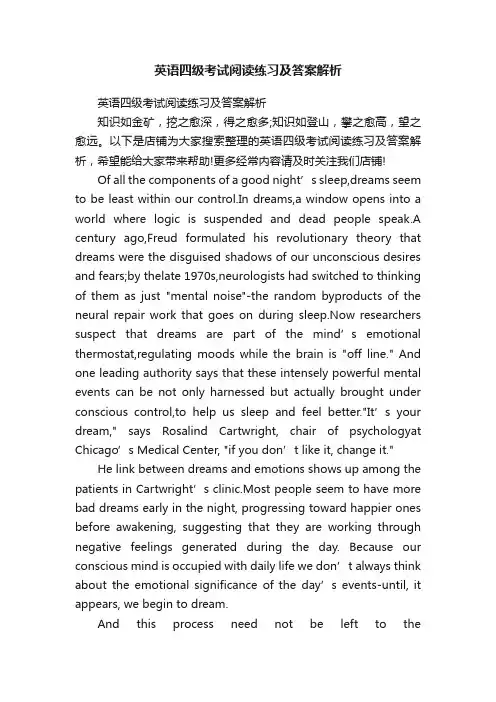
英语四级考试阅读练习及答案解析英语四级考试阅读练习及答案解析知识如金矿,挖之愈深,得之愈多;知识如登山,攀之愈高,望之愈远。
以下是店铺为大家搜索整理的英语四级考试阅读练习及答案解析,希望能给大家带来帮助!更多经常内容请及时关注我们店铺!Of all the components of a good night’s sleep,dreams seem to be least within our control.In dreams,a window opens into a world where logic is suspended and dead people speak.A century ago,Freud formulated his revolutionary theory that dreams were the disguised shadows of our unconscious desires and fears;by thelate 1970s,neurologists had switched to thinking of them as just "mental noise"-the random byproducts of the neural repair work that goes on during sleep.Now researchers suspect that dreams are part of the mind’s emotional thermostat,regulating moods while the brain is "off line." And one leading authority says that these intensely powerful mental events can be not only harnessed but actually brought under conscious control,to help us sleep and feel better."It’s your dream," says Rosalind Cartwright, chair of psychologyat Chicago’s Medical Center, "if you don’t like it, change it."He link between dreams and emotions shows up among the patients in Cartwright’s clinic.Most people seem to have more bad dreams early in the night, progressing toward happier ones before awakening, suggesting that they are working through negative feelings generated during the day. Because our conscious mind is occupied with daily life we don’t always think about the emotional significance of the day’s events-until, it appears, we begin to dream.And this process need not be left to theunconscious.Cartwright believes one can exercise conscious control over recurring bad dreams.As soon as you awaken,identify what is upsetting about the dream. Visualizehow you would like it to end instead;the next time it occurs, try to wake up just enough to control its course.With much practice people can learn to,literally,do it in their sleep.At the end of the day,there’s probably little reason to pay attention to our dreams at all unless they keep us from sleeping or "we wake up in panic," Cartwright says.Terrorism,economic uncertainties and general feelings of insecurity have increased people’s anxiety.Those suffering from persistent nightmares should seek help from a therapist. For the rest of us,the brain has its ways of working through bad feelings.Sleep-or rather dream-on it and you’ll feel better in the morning.英语四级阅读模拟题:Choose correct answers to the question:1.By saying that “dreams are part of the mind’s emotional thermostat," (Lines 4-5, Para. 1) the researchers mean that _______.A.we can think logically in the dreams tooB.dreams can be brought under conscious controlC.dreams represent our unconscious desires and fearsD.dreams can help us keep our mood comparatively stable2.What did Cartwright find in her clinic?A.Most bad dreams were followed by happier ones.B.Divorced couples usually have more bad dreams.C.One’s dreaming process is related to his emotion.D.People having negative feelings dream more often.3.Cartwright believed with much practice,we can learn to _____.A.control what dreams to dreamB.sleep well without any dreamsC.wake up in time to stop the bad dreamsD.identify what is upsetting about the dreams4.The author points out that a person who has constant bad dreams should ______A.learn to control his dreamsB.consult a doctorC.sleep and dream on itD.get rid of anxiety first5.The author most probably thinks that controlling dreams is ______.A.a good practiceB.a new discoveryC.helpful for everyoneD.not essential for everyone参考答案1.[D] 词义理解题。
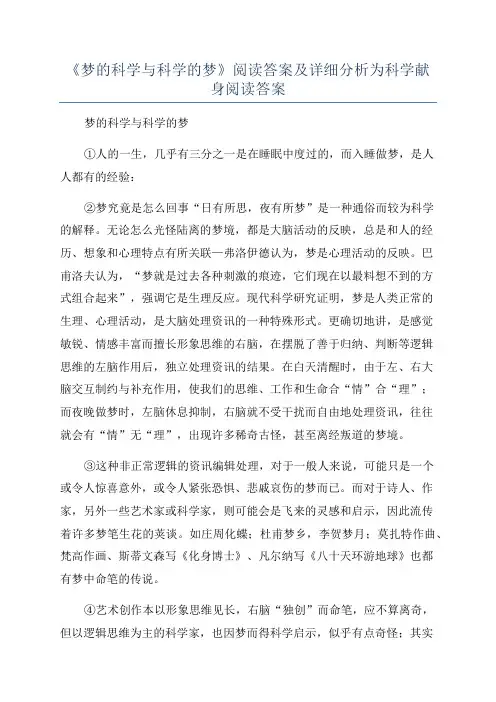
《梦的科学与科学的梦》阅读答案及详细分析为科学献身阅读答案梦的科学与科学的梦①人的一生,几乎有三分之一是在睡眠中度过的,而入睡做梦,是人人都有的经验:②梦究竟是怎么回事“日有所思,夜有所梦”是一种通俗而较为科学的解释。
无论怎么光怪陆离的梦境,都是大脑活动的反映,总是和人的经历、想象和心理特点有所关联—弗洛伊德认为,梦是心理活动的反映。
巴甫洛夫认为,“梦就是过去各种刺激的痕迹,它们现在以最料想不到的方式组合起来”,强调它是生理反应。
现代科学研究证明,梦是人类正常的生理、心理活动,是大脑处理资讯的一种特殊形式。
更确切地讲,是感觉敏锐、情感丰富而擅长形象思维的右脑,在摆脱了善于归纳、判断等逻辑思维的左脑作用后,独立处理资讯的结果。
在白天清醒时,由于左、右大脑交互制约与补充作用,使我们的思维、工作和生命合“情”合“理”;而夜晚做梦时,左脑休息抑制,右脑就不受干扰而自由地处理资讯,往往就会有“情”无“理”,出现许多稀奇古怪,甚至离经叛道的梦境。
③这种非正常逻辑的资讯编辑处理,对于一般人来说,可能只是一个或令人惊喜意外,或令人紧张恐惧、悲戚哀伤的梦而已。
而对于诗人、作家,另外一些艺术家或科学家,则可能会是飞来的灵感和启示,因此流传着许多梦笔生花的荚谈。
如庄周化蝶;杜甫梦乡,李贺梦月;莫扎特作曲、梵高作画、斯蒂文森写《化身博士》、凡尔纳写《八十天环游地球》也都有梦中命笔的传说。
④艺术创作本以形象思维见长,右脑“独创”而命笔,应不算离奇,但以逻辑思维为主的科学家,也因梦而得科学启示,似乎有点奇怪;其实深思一下也可明白,科学的发展和突破,很多时候就是要对原有的“科学”进行新的认识,甚至要否定,不太循规蹈矩的右脑往往比左脑更敢于创新、突破。
我们都知道有几个著名的“科学的梦”:凯库勒因梦见碳原于跳着像首尾相咬的蛇一样的环舞,而悟出了苯分子的环形结构,从而揭开了有机化学史上光辉的一页;门捷列夫梦见元素像小孩纵横排列的队伍,因而发现了元素周期律的奥秘。
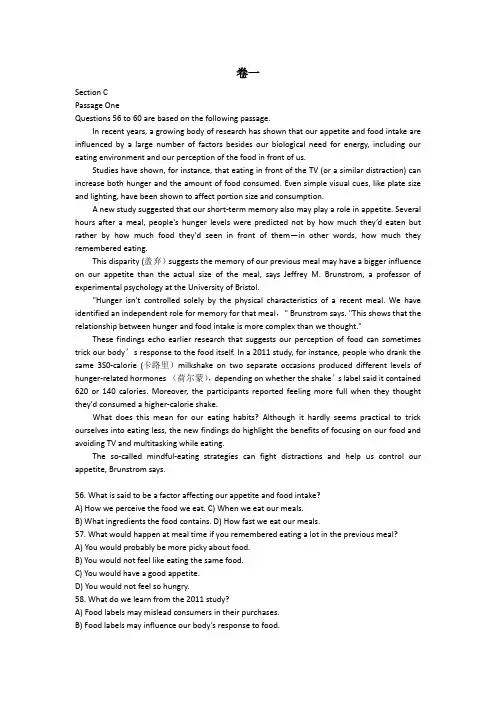
卷一Section CPassage OneQuestions 56 to 60 are based on the following passage.In recent years, a growing body of research has shown that our appetite and food intake are influenced by a large number of factors besides our biological need for energy, including our eating environment and our perception of the food in front of us.Studies have shown, for instance, that eating in front of the TV (or a similar distraction) can increase both hunger and the amount of food consumed. Even simple visual cues, like plate size and lighting, have been shown to affect portion size and consumption.A new study suggested that our short-term memory also may play a role in appetite. Several hours after a meal, people's hunger levels were predicted not by how much they’d eaten but rather by how much food they'd seen in front of them—in other words, how much they remembered eating.This disparity (盖弃)suggests the memory of our previous meal may have a bigger influence on our appetite than the actual size of the meal, says Jeffrey M. Brunstrom, a professor of experimental psychology at the University of Bristol."Hunger isn't controlled solely by the physical characteristics of a recent meal. We have identified an independent role for memory for that meal," Brunstrom says. "This shows that the relationship between hunger and food intake is more complex than we thought."These findings echo earlier research that suggests our perception of food can sometimes trick our body’s response to the food itself. In a 2011 study, for instance, people who drank the same 3S0-calorie (卡路里)milkshake on two separate occasions produced different levels of hunger-related hormones (荷尔蒙),depending on whether the shake’s label said it contained 620 or 140 calories. Moreover, the participants reported feeling more full when they thought they'd consumed a higher-calorie shake.What does this mean for our eating habits? Although it hardly seems practical to trick ourselves into eating less, the new findings do highlight the benefits of focusing on our food and avoiding TV and multitasking while eating.The so-called mindful-eating strategies can fight distractions and help us control our appetite, Brunstrom says.56. What is said to be a factor affecting our appetite and food intake?A) How we perceive the food we eat. C) When we eat our meals.B) What ingredients the food contains. D) How fast we eat our meals.57. What would happen at meal time if you remembered eating a lot in the previous meal?A) You would probably be more picky about food.B) You would not feel like eating the same food.C) You would have a good appetite.D) You would not feel so hungry.58. What do we learn from the 2011 study?A) Food labels may mislead consumers in their purchases.B) Food labels may influence our body’s response to food.C) Hunger levels depend on one's consumption of calories.D) People tend to take in a lot more calories than necessary.59. What does Brunstrom suggest we do to control our appetite?A) Trick ourselves into eating less. C) Concentrate on food while eating.B) Choose food with fewer calories. D) Pick dishes of the right size.60. What is the main idea of the passage?A) Eating distractions often affect our food digestion.B) Psychological factors influence our hunger levels.C) Our food intake is determined by our biological needs.D) Good eating habits will contribute to our health.Passage TwoQuestions 61 to 65 are based on the following passage.As a society we might want to rethink the time and money spent on education, so that these resources can benefit a greater percentage of the population. Ideally, both high schools and colleges can prepare individuals for the ever-changing roles that are likely to be expected of them.High school degrees offer far less in the way of preparation for work than they might, or than many other nations currently offer, creating a growing skills gap in our economy. We encourage students to go on to college whether they are prepared or not, or have a clear sense of purpose or interest, and now have the highest college dropout rate in the world.We might look to other countries for models of how high schools can offer better training, as well as the development of a work ethic (勤奋工作的美德)and the intellectual skills needed for continued learning and development. I recommend Harvard's 2011 "Pathways to Prosperity" report for more attention to the "forgotten half" (those who do not go on to college) and ideas about how to address this issue.Simultaneously, the liberal arts become more important than ever. In a knowledge economy where professional roles change rapidly and many college students are preparing for positions that may not even exist yet, the skill set needed is one that prepares them for change and continued learning.Learning to express ideas well in both writing and speech, knowing how to find information, and knowing how to do research are all-solid background skills for a wide variety of roles, and such training is more important than any particular major in a liberal arts college. We need to continue to value broad preparation in thinking skills ihat will serve for a lifetime.Students also need to learn to work independently and to make responsible decisions. The lengthening path to adulthood appears exacerbated (惡化)by parental involvement in the college years. Given the rising investment in college education, parental concern is not surprising, but learning where and when to intervene (干预)will help students take more ownership of the outcomes of these increasingly costly educations.61. What kind of education does the author think is ideal?A) It benefits the great majority of the general population.B) It prepares students to meet the future needs of society.C) It encourages students to learn throughout their lives.D) It ensures that students' expectations are successfully fulfilled.62. What does the author say is the problem with present high school education?A) Ignoring the needs of those who don't go to college.B) Teaching skills to be used right after graduation only.C) Giving little attention to those having difficulty learning.D) Creating the highest dropout rate in the developed world.63. What characterizes a knowledge economy according to the passage?A) People have to receive higher education to qualify for a professional position.B) Students majoring in liberal arts usually have difficulty securing a job.C) New positions are constantly created that require people to keep learning.D) Colleges find it hard to teach students how to cope with the changing economy.64. What does the author think a liberal arts college should focus on?A) Solid background knowledge in a particular field.B) Practical skills urgently needed in current society.C) Basic skills needed for change and lifelong learning.D) Useful thinking skills for advanced academic research.65. What suggestion docs the author offer to parents?A) Rethinking the value of higher education.B) Investing wisely in their children's education.C) Helping their children lo bring their talent into full play.D) Avoiding too much intervention in their children’s education.Section CPassage One参考译文(56) (60)近年来,越来越多的研究表明:除了对能量的生理需要外,人们的食欲和食物摄取受到诸多因素的影响,包括人们的饮食环境和对面前食物的认知。
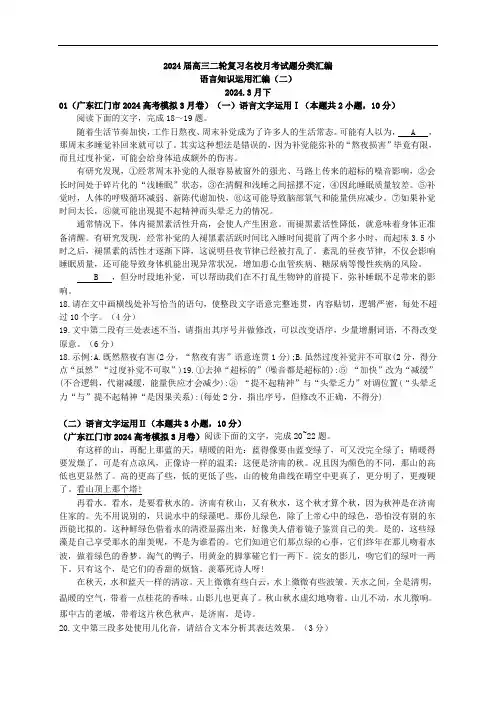
2024届高三二轮复习名校月考试题分类汇编语言知识运用汇编(二)2024.3月下01(广东江门市2024高考模拟3月卷)(一)语言文字运用Ⅰ(本题共2小题,10分)阅读下面的文字,完成18~19题。
随着生活节奏加快,工作日熬夜、周末补觉成为了许多人的生活常态。
可能有人以为, A ,那周末多睡觉补回来就可以了。
其实这种想法是错误的,因为补觉能弥补的“熬夜损害”毕竟有限,而且过度补觉,可能会给身体造成额外的伤害。
有研究发现,①经常周末补觉的人很容易被窗外的强光、马路上传来的超标的噪音影响,②会长时间处于碎片化的“浅睡眠”状态,③在清醒和浅睡之间摇摆不定,④因此睡眠质量较差。
⑤补觉时,人体的呼吸循环减弱、新陈代谢加快,⑥这可能导致脑部氧气和能量供应减少。
⑦如果补觉时间太长,⑧就可能出现提不起精神而头晕乏力的情况。
通常情况下,体内褪黑素活性升高,会使人产生困意。
而褪黑素活性降低,就意味着身体正准备清醒。
有研究发现,经常补觉的人褪黑素活跃时间比入睡时间提前了两个多小时,而起床3.5小时之后,褪黑素的活性才逐渐下降,这说明昼夜节律已经被打乱了。
紊乱的昼夜节律,不仅会影响睡眠质量,还可能导致身体机能出现异常状况,增加患心血管疾病、糖尿病等慢性疾病的风险。
B ,但分时段地补觉,可以帮助我们在不打乱生物钟的前提下,弥补睡眠不足带来的影响。
18.请在文中画横线处补写恰当的语句,使整段文字语意完整连贯,内容贴切,逻辑严密,每处不超过10个字。
(4分)19.文中第二段有三处表述不当,请指出其序号并做修改,可以改变语序,少量增删词语,不得改变原意。
(6分)18.示例:A.既然熬夜有害(2分,“熬夜有害”语意连贯1分);B.虽然过度补觉并不可取(2分,得分点“虽然”“过度补觉不可取”)19.①去掉“超标的”(噪音都是超标的):⑤“加快”改为“减缓”(不合逻辑,代谢减缓,能量供应才会减少):⑧“提不起精神”与“头晕乏力”对调位置(“头晕乏力“与”提不起精神“是因果关系):(每处2分,指出序号,但修改不正确,不得分)(二)语言文字运用Ⅱ(本题共3小题,10分)(广东江门市2024高考模拟3月卷)阅读下面的文字,完成20~22题。
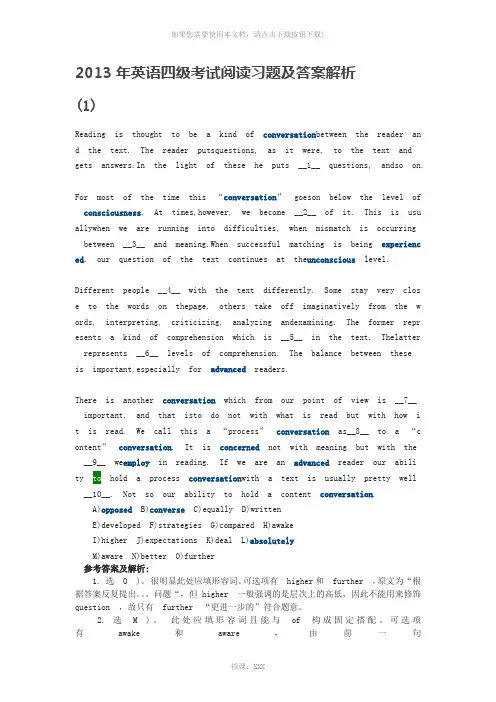
2013年英语四级考试阅读习题及答案解析(1)Reading is thought to be a kind of conversation between the reader an d the text. The reader putsquestions, as it were, to the text and gets answers.In the light of these he puts __1__ questions, andso on.For most of the time this “conversation”goeson below the level of consciousness. At times,however, we become __2__ of it. This is usu allywhen we are running into difficulties, when mismatch is occurring between __3__ and meaning.When successful matching is being experienc ed, our question of the text continues at the unconscious level.Different people __4__ with the text differently. Some stay very clos e to the words on thepage, others take off imaginatively from the w ords, interpreting, criticizing, analyzing andexamining. The former repr esents a kind of comprehension which is __5__ in the text. Thelatter represents __6__ levels of comprehension. The balance between theseis important,especially for advanced readers.There is another conversation which from our point of view is __7__ important, and that isto do not with what is read but with how i t is read. We call this a “process”conversation as__8__ to a “c ontent”conversation. It is concerned not with meaning but with the__9__ we employ in reading. If we are an advanced reader our ability hold a process conversation with a text is usually pretty well__10__. Not so our ability to hold a content conversation.A)opposed B)converse C)equally D)writtenE)developed F)strategies G)compared H)awakeI)higher J)expectations K)deal L)absolutelyM)aware N)better O)further参考答案及解析:1. 选O )。
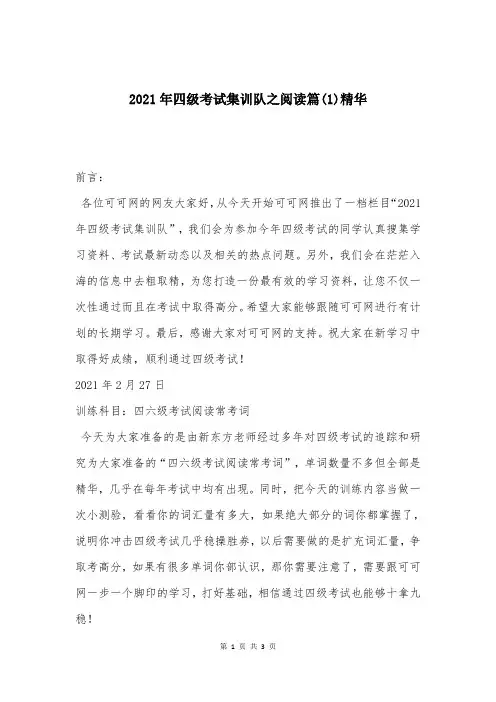
2021年四级考试集训队之阅读篇(1)精华前言:各位可可网的网友大家好,从今天开始可可网推出了一档栏目“2021年四级考试集训队”,我们会为参加今年四级考试的同学认真搜集学习资料、考试最新动态以及相关的热点问题。
另外,我们会在茫茫入海的信息中去粗取精,为您打造一份最有效的学习资料,让您不仅一次性通过而且在考试中取得高分。
希望大家能够跟随可可网进行有计划的长期学习。
最后,感谢大家对可可网的支持。
祝大家在新学习中取得好成绩,顺利通过四级考试!2021年2月27日训练科目:四六级考试阅读常考词今天为大家准备的是由新东方老师经过多年对四级考试的追踪和研究为大家准备的“四六级考试阅读常考词”,单词数量不多但全部是精华,几乎在每年考试中均有出现。
同时,把今天的训练内容当做一次小测验,看看你的词汇量有多大,如果绝大部分的词你都掌握了,说明你冲击四级考试几乎稳操胜券,以后需要做的是扩充词汇量,争取考高分,如果有很多单词你部认识,那你需要注意了,需要跟可可网一步一个脚印的学习,打好基础,相信通过四级考试也能够十拿九稳!以下是这些常考单词,不会的要查字典并且记牢!forcer. enforce. reinforce. report. scope. spirit. decline. climate. lend to. occasion.accuse. afford. anxiety. atmosphere. blame. bargain. calculate. circle. confidence.conscious. convince. custom. desperate. encourage. discourage. economic.economy. motive. promote. emotional. motion. fail to. install. flat. intimate. limit.major. no matter. neutral. outlet. perform. inform. formal. normal. radiate. authority.companion. concept. create. creature. dentist. fluid. identify. identical. identity.engage. entitle. evaluate. influence. fortune. fulfill. general. intense. interpret.justice. adjust. judge. minor. observe. deserve. preserve. parallel. percept. stuff.surroundings. transport. transmit. transform. undergo. wander. wonder. widespread.ambition. approach. brief. conquer. result. consult. insult.deliberate. despair. compare.emergence. emergency. establish. exhaust. expand. fade. frustrate. handy. incredible.inheri. conference. infer. offer. interfere. length. manufacture. mood. necessity. noble.记单词总是容易让人枯燥,给大家推荐一首法语歌:歌舞青春:Aller Plus Loin《走得更远》。
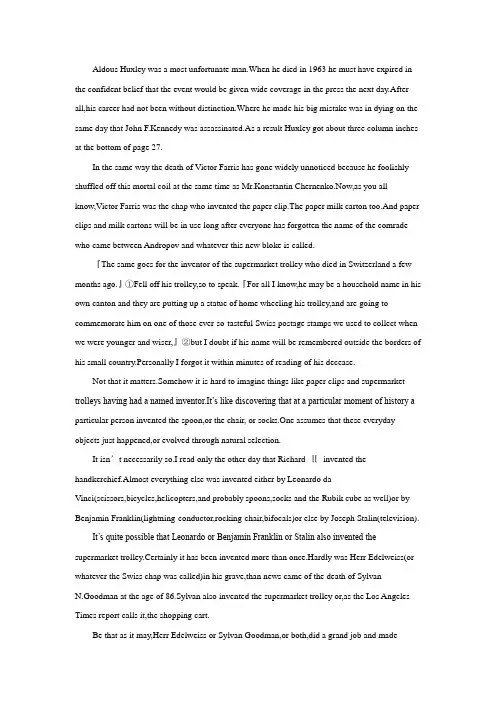
Aldous Huxley was a most unfortunate man.When he died in 1963 he must have expired in the confident belief that the event would be given wide coverage in the press the next day.After all,his career had not been without distinction.Where he made his big mistake was in dying on the same day that John F.Kennedy was assassinated.As a result Huxley got about three column inches at the bottom of page 27.In the same way the death of Victor Farris has gone widely unnoticed because he foolishly shuffled off this mortal coil at the same time as Mr.Konstantin Chernenko.Now,as you all know,Victor Farris was the chap who invented the paper clip.The paper milk carton too.And paper clips and milk cartons will be in use long after everyone has forgotten the name of the comrade who came between Andropov and whatever this new bloke is called.『The same goes for the inventor of the supermarket trolley who died in Switzerland a few months ago.』①Fell off his trolley,so to speak.『For all I know,he may be a household name in his own canton and they are putting up a statue of home wheeling his trolley,and are going to commemorate him on one of those ever-so-tasteful Swiss postage stamps we used to collect when we were younger and wiser,』②but I doubt if his name will be remembered outside the borders of his small country.Personally I forgot it within minutes of reading of his decease.Not that it matters.Somehow it is hard to imagine things like paper clips and supermarket trolleys having had a named inventor.It’s like discovering that at a particular moment of history a particular person invented the spoon,or the chair, or socks.One assumes that these everyday objects just happened,or evolved through natural selection.It isn’t necessarily so.I read only the other day that Richard Ⅱinvented the handkerchief.Almost everything else was invented either by Leonardo daVinci(scissors,bicycles,helicopters,and probably spoons,socks and the Rubik cube as well)or by Benjamin Franklin(lightning-conductor,rocking-chair,bifocals)or else by Joseph Stalin(television).It’s quite possible that Leonardo or Benjamin Franklin or Stalin also invented the supermarket trolley.Certainly it has been invented more than once.Hardly was Herr Edelweiss(or whatever the Swiss chap was called)in his grave,than news came of the death of SylvanN.Goodman at the age of 86.Sylvan also invented the supermarket trolley or,as the Los Angeles Times report calls it,the shopping cart.Be that as it may,Herr Edelweiss or Sylvan Goodman,or both,did a grand job and madesupermarket shopping far less hellish than it would otherwise be.The next step will be to get the trolleys out of the shops and into the streets.You could put an engine in the front and call it a car.Or give it big wheels and a canopy and call it a pram.The possibilities are endless.1.It can be inferred from the passage that Herr Edelweiss.A.was remembered by the people all over worldB.made a lot of money from his inventionC.was not very famousD.was a business partner of Sylvan Goodman2.The author writes this article in order to illustrate that.A.the names of the people who invented the most useful things are usually forgottenB.everyday objects are invented and evolve through natural selectionC.many everyday objects are invented more than onceD.many famous people have passed away without being noticed3.Who probably invented spoons?A.Leonardo da Vinci.B.Benjamin Franklin.C.Victor Farris.D.A person unknown.4. By stating that Leonardo da Vinci invented helicopters, the author means .A. he really did itB. he is a military scientistC. he painted in one of his masterpieces a helicoptersD. people turn to ascribe inventions to him but they are wrong5.What can be inferred about Aldous Huxley?A.His death was not reported by the press.B.He was a famous inventor.C.He made a very big mistake in his late years.D.He died on the same day as John F.Kenneddy.V ocabulary1.canopy n. 天篷2.pram n. 婴儿车长难句解析①【解析】“the same goes”解析为同样的事情也发生,例:The same goes for our classmates.同样的事情也发生在我的同学身上。
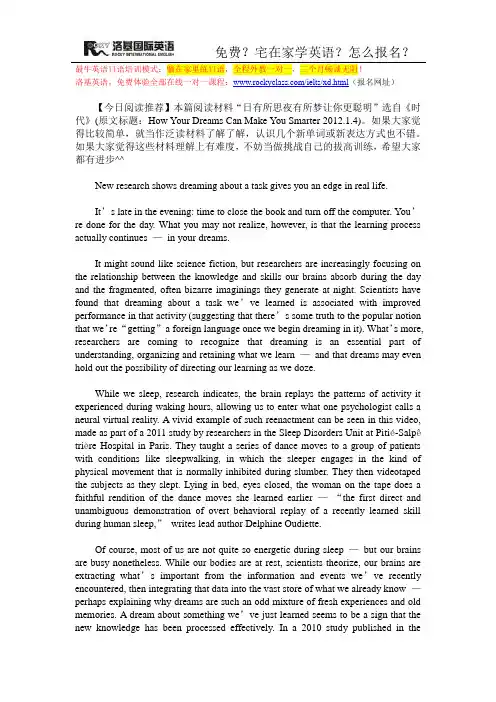
最牛英语口语培训模式:躺在家里练口语,全程外教一对一,三个月畅谈无阻!洛基英语,免费体验全部在线一对一课程:/ielts/xd.html(报名网址)【今日阅读推荐】本篇阅读材料“日有所思夜有所梦让你更聪明”选自《时代》(原文标题:How Your Dreams Can Make You Smarter 2012.1.4)。
如果大家觉得比较简单,就当作泛读材料了解了解,认识几个新单词或新表达方式也不错。
如果大家觉得这些材料理解上有难度,不妨当做挑战自己的拔高训练,希望大家都有进步^^New research shows dreaming about a task gives you an edge in real life.It’s late in the evening: time to close the book and turn off the computer. You’re done for the day. What you may not realize, however, is that the learning process actually continues —in your dreams.It might sound like science fiction, but researchers are increasingly focusing on the relationship between the knowledge and skills our brains absorb during the day and the fragmented, often bizarre imaginings they generate at night. Scientists have found that dreaming about a task we’ve learned is associated with improved performance in that activity (suggesting that there’s some truth to the popular notion that we’re “getting”a foreign language once we begin dreaming in it). What’s more, researchers are coming to recognize that dreaming is an essential part of understanding, organizing and retaining what we learn —and that dreams may even hold out the possibility of directing our learning as we doze.While we sleep, research indicates, the brain replays the patterns of activity it experienced during waking hours, allowing us to enter what one psychologist calls a neural virtual reality. A vivid example of such reenactment can be seen in this video, made as part of a 2011 study by researchers in the Sleep Disorders Unit at Pitié-Salpêtrière Hospital in Paris. They taught a series of dance moves to a group of patients with conditions like sleepwalking, in which the sleeper engages in the kind of physical movement that is normally inhibited during slumber. They then videotaped the subjects as they slept. Lying in bed, eyes closed, the woman on the tape does a faithful rendition of the dance moves she learned earlier —“the first direct and unambiguous demonstration of overt behavioral replay of a recently learned skill during human sleep,”writes lead author Delphine Oudiette.Of course, most of us are not quite so energetic during sleep —but our brains are busy nonetheless. While our bodies are at rest, scientists theorize, our brains are extracting what’s important from the information and events we’ve recently encountered, then integrating that data into the vast store of what we already know —perhaps explaining why dreams are such an odd mixture of fresh experiences and old memories. A dream about something we’ve just learned seems to be a sign that the new knowledge has been processed effectively. In a 2010 study published in thejournal Current Biology, researchers at Harvard Medical School reported that college students who dreamed about a computer maze task they had learned showed a 10-fold improvement in their ability to navigate the maze compared to participants who did not dream about the task.Robert Stickgold, one of the Harvard researchers, suggests that studying right before bedtime or taking a nap following a study session in the afternoon might increase the odds of dreaming about the material. But some scientists are pushing the notion of enhancing learning through dreaming even further, asking sleepers to mentally practice skills while they slumber. In a pilot study published in The Sport Psychologist journal in 2010, University of Bern psychologist Daniel Erlacher instructed participants to dream about tossing coins into a cup. Those who successfully dreamed about the task showed significant improvement in their real-life coin-tossing abilities. Experiments like Erlacher’s raise the possibility that we could train ourselves to cultivate skills while we slumber. Think about that as your head hits the pillow tonight.【重点单词及短语】retain v. 保持;记住hold out 坚持;伸出;提供;维持slumber v. 睡眠;麻木状态;静止状态v. 睡眠;蛰伏;麻木overt adj. 明显的;公然的;蓄意的extract v. 提取;取出;摘录integrate into 成为一体,融入;使……并入navigate v. 驾驶,操纵;使通过odd adj. 古怪的take a nap 睡午觉;小睡一下odds n. 几率;胜算pilot study 初步研究;预备试验toss sth. into 把……扔进Question time:1. What have scientists found between dreams and what we learn?2. How do our brains act when we are at rest?“成千上万人疯狂下载。
逐梦金红柳①每个人都会做梦,梦就像是一个人的灵魂,伴随人的一生。
梦既司空见惯,又神秘莫测;梦既虚无飘渺,又真实可见。
②关于梦,从古到今始终有一层神秘的色彩。
大脑到底是如何形成那些无拘无束的梦呢?迄今为止,众说纷纭。
目前公认的观点是:从生理上看,人的睡眠总是处于有规律的快波睡眠和慢波睡眠的交替之中,梦是快波睡眠的一种表现,人在此阶段,供给大脑皮质的血流量增加,耗氧量也增多,这时不仅呼吸加快,心跳和血压也出现波动。
这说明此时人虽处于睡眠状态,但大脑皮质的某些区域仍处于紧张的活动状态,梦就发生在这“动乱”之际。
从心理上分析,就如古人所说“日有所思,夜有所梦”。
的确,梦的内客与白天发生的事情有关系,但梦决不都是日常生活的翻版,而是生活内容经过“改装”后的产物。
比如,梦见从山上掉下来,可能预示着害怕失败或者遇到不可克服的困难。
但要记住梦是经过“伪装”的,现实只是梦形成的基础。
③梦,正是囤为它所具有的这种特殊的“现实性”和“理想性”,广大文人志士乐于用梦寄托自己的人生理想或情感追求。
李白借用“忽复乘舟梦日边”,表明自己对从政仍有所期待,。
南朝乐府《西洲曲》吟出“南风知我意,吹梦到西洲。
”唐张若虚《春江花月夜》感叹“昨夜闲潭梦落花,可怜春半不还家。
”游子的思乡之苦黯然销魂,也只有在梦中得到暂时的慰藉。
甚至毛泽东都感叹“别梦依稀咒逝川,故园三十二年前。
”④梦,它不仅让我们充满希望,更激发我们的斗志与追求。
如今一个响亮的词汇——“中国梦”,正震撼着每一个中国人的心灵,激励着每一个炎黄子孙。
千百年来,有多少仁人志士为了中华民族傲然屹立于世界民族之林,引领着我们不停地在寻梦、追梦。
他们以“穷则独善其身,达则兼济天下”的 A ,以“富贵不能淫,贫贱不能移,威武不能屈”的 B ,以“人生自古谁无死,留取丹心照汗青”的 C ,以“天下兴亡,匹夫有责”的 D ,为“天地立心、为生民立命、为万世开大平”。
⑤中国梦是中华民族五千年来生生不息的不懈追求和美好的向往!中国梦是历史的、现实的、也是未来的!中国梦,也是每个中国人的梦!世界必将见证,一个更加美丽的中国梦将在我们手中梦想成真!1.仔细阅读文段②,用简洁的语言概括梦形成的原因。
经常做梦的人更聪明吗日有所思夜有所梦,有些梦境能够被长时间记住,有些梦境醒来就忘记了,很多人都有这种感受,当心中有事,特别是自己比较重视或者担心的事情,很容易在夜晚的梦境中梦到,有些人说经常做梦的人比较聪明,下面我们来了解下经常做梦的人更聪明吗。
经常做梦的人更聪明吗有研究表明京城做梦的人会比较聪明。
首先做梦能反映身心状态。
现代人过度关注外在世界,无暇关注内心感受,导致自我压抑。
梦境正是内心各种被压抑欲望的呐喊,提醒我们及时应对。
梦还能反映身体状况,如患有慢性脑病的老人,梦的数量明显少于正常的同龄老人。
其次,做梦能减轻焦虑。
不管你是高尚的人,还是卑微的人,心灵深处都藏着许多欲望。
精神分析心理学认为,梦能满足欲望,调节心理平衡。
再次,做梦有助于学习。
心理学家让受试者在白天学习知识。
晚上,其中一组人可不受干扰地安睡,另一组人则在脑电监测仪显示他正在做梦时被叫醒。
结果发现,在梦中被叫醒的人学习能力差。
经常做梦的人更聪明的原因是什么婴幼儿的睡眠过程当中,做梦睡眠的比例非常高。
这恰恰是脑神经系统发育必需的一个生理过程。
在有充分的做梦睡眠情况下,神经系统才能够比较健康地发育。
如果孩子睡眠时做梦很少,或几乎不做梦,在临床中可以看到这个孩子智商很低。
做梦能整合信息。
睡梦中,大脑会把新知识与旧知识进行整合,强化记忆、启发思维。
所谓做梦,通俗来说就是我们在水面状态下的一种心理活动,这也是要消耗一定能量的,特别是做噩梦,容易从睡梦中惊醒,做梦是人在睡眠状态下不可避免的,当然也要提醒大家入睡前可以尝试些轻松愉悦的活动,比如听音乐,散步,有助于提高睡眠质量。
怀孕8周孕囊小怎么办怀孕8周的时候,已经到了孕两个月的时候。
这个时候的孕囊已经发育得比较大了,可以在b超中看到孕囊了。
但是有的时候怀孕8周孕囊会出现偏小的情况。
这种情况到底应该怎么办呢?怀孕8周孕囊到底多大算是正常的呢?孕囊偏小怎么办?首先,由于情绪紧张等原因导致孕妇月经推迟、排卵期错后、受孕时间晚,从而出现孕囊较实际停经天数小。
我们能在梦里背单词吗?阅读附答案我们能在梦里背单词吗?1你是不是也有过这样的经历:白天学习的数学公式和推导过程,晚上出现在梦中,让你和数学题大战300回合;白天练习过英语对话,梦中你就可以非常流利地和外国人交谈,通常我们会称这种现象为“日有所思,夜有所梦”。
最近,科学家对这种现象做了进一步研究,结果发现,做梦真的可以帮助我们学习和记忆新学的知识,梦中的你的确是在学习的。
2睡眠的过程分成不同的脑电波阶段:非快速眼动睡眠,此时脑电波为慢波;快速眼动睡眠,此时脑电波频率较快。
其中做梦是处于快速眼动睡眠状态,也就是我们俗称的深度睡眠时期。
正常人入睡时先进入浅睡,即非快速眼动睡眠阶段,然后再进入做梦阶段,从入睡到做梦阶段为一个睡眠周期,一般一夜睡眠经历4~5个睡眠周期的交替。
3当然,我们仅仅知道做梦时怎么回事,还不足以解决问题。
最近,神经科学家埃林和罗伯特找了一些哈佛大学的本科生进行了如下实验:他们让这些学生在电脑前坐45分钟,玩一个迷宫游戏。
在迷宫中,研究者将一个特定的对象设为终点,让学生们记住,然后让他们从迷宫里一个随意的点出发,找到到达终点的途径,做完游戏之后,学生们被分为两组,一组人去睡觉,一组人则留下来看录像。
研究者利用脑电技术探测了睡觉组的大脑活动,之后在一个做梦周期结束时叫醒他们一次,问他们梦到了什么,或者在他们睡完午睡醒来之后问他们做梦的情况。
接着对两组人再进行一次迷宫游戏的测试,结果表明,在测试中,睡觉组相对于不睡觉组更快地找到了特定目标,其中还有4位同学做梦梦到了迷宫,他们找到特定目标的速度是其他睡觉组成员的10倍!做梦促进了他们的学习和记忆。
4对于上述研究,研究者有进一步的解释。
研究发现,做梦能够导致记忆的再激活。
因为梦的周期正好对应着神经同步的增强期,此时大量的神经元能够被同时激活,从而提高对特定事物的记忆。
在上述研究中,罗伯特等人就注意到,被试者的梦并不仅是对刚学习过的迷宫经验的精确重现,还激活了相似的经验。
初四语文优生作业2013、12、261、按要求修改下面一段文字。
①梦境与睡眠深浅程度有关。
②噱咙入睡时,大脑皮层里的抑制程度比较浅,梦境就更加塑近现实生活,正是“日有所思,夜有所梦”。
③甚至有时自己也觉察到在做梦,所以不能主动地控制,只能听其自然发展。
④睡眠稍深一些,梦境则有明显的虚幻性和荒诞性,一时在东,一时在西,或者与死去已久的亲人在一起,而自己毫无判断辨别的能力。
⑤这就是大脑里抑制程度更深。
⑥比如,白天深思一道数学题,梦里也可能在做数学;白天搞技术发明,梦里也可能搞同样的工作。
(1)第②句画线部分搭配不当的词语是,应改为(2)第③句画线部分使用不当的关联词是,应改为(3)第⑤句画线部分应补出的词语是,应放在(4)第⑥句位置不当,应放在第句的后面2、下列没有语病的一项是()A.每个中学生将来都希望自己成为有用人才。
B.能否保护好水资源,是关系到人类可持续发展的大事。
C.小明的学习成绩是班级中最好的同学。
D.参加家务劳动,可培养我们的动手能力、责任心和自信心。
3、下列没有语病的一项是 ( )A那石板多年前由父亲从山上背下来,每块大约三百来斤左右。
B后来父亲的脚终于洗好了,终于洗出了脚的本色。
C台阶旁栽着一棵桃树,台阶遮出一大片绿阴。
D他觉得终于可以造屋了,便破土动工,选定一个日子。
4、下列没有语病的一项是 ( )A通过老师的一番教育,我认识到了自己的错误。
B故事会上,有几个同学精彩的表演,赢得了同学们的阵阵掌声。
C《雷雨》这部话剧塑造了很多令人难忘的情节。
D只要坚持不懈的攀登,我们才能到达光辉的顶点。
5、下列句子中没有语病的一项是 ( )A白衣天使奋战在抗击非典的第一线,他们动人的事迹和牺牲精神在广大人民心中传扬。
B在阅读文学名著的过程中,使我明白了许多做人的道理,感悟了人生的真谛。
C我们要与自然和谐相处,保护好属于我们人类自己的家园——地球。
D那蝉声在晨光朦胧之中非常分外轻逸,似远似近,似近似远,又似有似无。
Most people learn languages to help them communicate. Now a study of recent research into brain function reveals that students could be gaining a lot more from their pursuit of linguistic skills.The chief reason most people want to learn English is to be able to communicate in the language and forge pathways into the wider world. Now a study published by the European Commission reveals that learning an additional language such as English may bring benefits that go beyond the ability to use the language itself. This report has implications for why, when and how we teach and learn English as a second or foreign language.The report, entitled The Contribution of Multilingualism to Creativity, includes a statistical analysis of key research into the impact that knowing and using more than one language has on thinking and the brain. It argues that there is a dovetailing of results between studies conducted over the last 40 years, including recent findings from the neurosciences. The research, often involving the use of neuro-imaging techniques, is helping us to understand more clearly what happens in the brain when a person learns or uses more than one language.One of the significant findings for English language teaching is that changes in the brain's electrical activity may occur much earlier than previously thought. It has been assumed that only command of different languages at very high levels would have an impact on brain function. But this study suggests that changes in the brain may start even in the earlier stages of language learning. This has implications for not only recognising the value of partial language competences, but also for understanding why certain language learning methodologies bring better results than others.The report identifies six areas in which the multilingual mind differs in some way to the monolingual mind. The term multilingual is used to describe people who use more than one language in their day-to-day lives. What we believe is significant about the evidence clusters is the similarity of outcomes resulting from different research approaches, and how they strengthen the position of foreign language learning by describing distinct types of added value. Most of the advantages described support overall competence-building for life and work in modern, information-rich, internet environments.The benefits reported include enhanced capacity for learning whereby knowledge of languages can lead to superior memory function, especially short-term "working" memory. This enables the brain to hold information longer while the thinking processes are engaged, which can have a profound impact on cognitive function. One implication is the positive impact of languages on the learning of other subjects.Another cluster concerns enhanced mental flexibility. This involves neural pathways being opened up, which extends the capacity to think and opens access to differing avenues for thought. Languages appear to exercise the brain as if it were a muscle and flexibility links directly to the development of digital literacies. For instance, some of the research in this area looks at the advantages of language knowledge in relation to the speed and accuracy of decision making when using multimedia such as gaming.Enhanced problem-solving capability is also reported. This involves superior performance in problem solving, which is cognitively demanding, including abstract thinking skills, higher concept formation skills and creative hypothesis formulation. It is about strengthening our capacity to identify, understand and solve problems. One aspect is the ability to ignore distracting and irrelevant information and focus on a given task. Another involves further development skills in the simultaneous handling of more than one task at a given time, otherwise known as multi-tasking.Greater understanding of how language functions and is used to achieve specific goals in life acts as the fourth cluster. This meta linguistic ability involves being able to "go beyond the words", helping an individual develop communication skills in both their first language and others. This is closely linked to enhanced interpersonal communication awareness and skills whereby people are better able to perceive the communicative needs of others, be more insightful in "reading" situations through contextual sensitivity, and develop interactional skills in communication.Finally the study reports on research that links knowledge of languages to a slowdown of age-related mental diminishment such as certain forms of dementia. Language knowledge appears to reduce the rate of decline of certain cognitive processes as a person ages, by helping the brain tolerate pathologies. This resistance to neuropathological damage is considered to be in the range of two to four years. Delays in mental decline of even up to six months are viewed as having considerable implications for individuals, their families and public health.Although we have not yet reached that eureka moment where a direct causal link between learning languages and specific cognitive advantages can be proven, the e vidence is building up fast. Since 2000 there has been a steady increase in the number of reports being published within what is loosely termed the educational n eurosciences, and some of these have direct implications for English language professionals.The cognitive neurosciences stress the need for powerful learning environments, and yet not enough of our language education is spent encouraging learners to engage in higher-order thinking about meaningful content that fires up the brain.【重点单词及短语】forge v. 打造;锻造go beyond 超出;胜过neurosciences 神经科学language competence 语⾔表达能⼒multilingual adj. 使⽤多种语⾔的 monolingual adj. 仅⽤⼀种语⾔的abstract thinking 抽象思维hypothesis formulation 假说形成;提出设想simultaneous adj. 同时的;同步的eureka 有了;找到了!(拓展知识:“eureka”原是古希腊语,意思是:“好啊!有办法啦!”古希腊学者阿基⽶德,有⼀次在浴盆⾥洗澡,突然来了灵感,发现了他久未解决的计算浮⼒问题的办法,因⽽惊喜地叫了⼀声“尤⾥卡”,从此发现了阿基⽶德定律。
一、语段阅读阅读下面的文字,完成1~4题。
修顿首再拜白司谏足下。
某年十七时,家随州,见天圣二年进士及第榜,始识足下姓名。
是时予年少,未与人接.,又居远方,但闻今宋舍人兄弟与叶道卿、郑天休数人者,以文学大有名,号称得人.而足下厕.其间,独无卓卓可道说者,予固疑足下,不知何如人也.其后更十一年,予再至京师,足下已为御史里行,然犹未暇一识足下之面;但时时于予友尹师鲁问足下之贤否,而师鲁说足下正直有学问,君子人也。
予犹疑之.夫正直者不可屈曲,有学问者必能辨是非;以不可屈之节,有能辨是非之明,又为言事之官,而俯仰默默,无异众人,是果贤者耶?此不得使予之不疑也.自足下为谏官来,始得相识,侃然正色.,论前世事,历历可听,褒贬是非,无一谬说.噫,持此辩.以示人,孰不爱之!虽予亦疑足下真君子也.是予自闻足下之名及相识,凡十有四年而三疑之。
今者推其实迹而较之,然后决知足下非君子也。
1.下列对加点字的解释不.正确的一项是( )A.是时予年少,未与人接.接:交往B.而足下厕.其间厕:厕所C.侃然正色.色:神色D.持此辩.以示人辩:言论解析:选B。
厕:夹杂。
2.下列各组句子中,加点词的意义不.相同的一项是()A.其.立朝有本末足下既不能为辨其.非辜B.以智文其过.人谁无过.C.庶.乎饰己不言之过三姓之后于今为庶.D.便当去.之十余日,高祖欲去.解析:选C。
A项,都是人称代词,他;B项,都是“过错”;C项,副词,希望/名词,平民;D项,都是“离开”。
3.下列叙述或分析不.符合原文意思的一项是()A.高司谏与宋舍人兄弟、叶道卿等人是同窗好友,相交莫逆,而且都以文学闻名,一起考上了进士。
B.欧阳修对高司谏的为人很怀疑,曾经向师鲁打听过。
C.欧阳修对高司谏的认识有一个三疑的过程,最后认定了高司谏不是个君子。
D.欧阳修对高司谏的评价是从高司谏的实际表现得出的,并非主观臆断.解析:选A。
A项,他们是同榜进士,但是他们的交情在文中没有提到。
本篇阅读材料“日有所思夜有所梦让你更聪明”选自《时代》(原文标题:How Your Dreams Can Make You Smarter 2012.1.4)。
如果大家觉得比较简单,就当作泛读材料了解了解,认识几个新单词或新表达方式也不错。
如果大家觉得这些材料理解上有难度,不妨当做挑战自己的拔高训练,希望大家都有进步^^
New research shows dreaming about a task gives you an edge in real life.
It’s late in the evening: time to close the book and turn off the computer. You’re done for the day. What you may not realize, however, is that the learning process actually continues — in your dreams.
It might sound like science fiction, but researchers are increasingly focusing on the relationship between the knowledge and skills our brains absorb during the day and the fragmented, often bizarre imaginings they generate at night. Scientists have found that dreaming about a task we’ve learned is associated with improved performance in that activity (suggesting that there’s some truth to the popular notion that we’re “getting” a foreign language once we begin dreaming in it). What’s more, researchers are coming to recognize that dreaming is an essential part of understanding, organizing and retaining what we learn — and that dreams may even hold out the possibility of directing our learning as we doze.
While we sleep, research indicates, the brain replays the patterns of activity it experienced during waking hours, allowing us to enter what one psychologist calls a neural virtual reality. A vivid example of such reenactment can be seen in this video, made as part of a 2011 study by researchers in the Sleep Disorders Unit at Pitié-Salpêtrière Hospital in Paris. They taught a series of dance moves to a group of patients with conditions like sleepwalking, in which the sleeper engages in the kind of physical movement that is normally inhibited during slumber. They then videotaped the subjects as they slept. Lying in bed, eyes closed, the woman on the tape does a faithful rendition of the dance moves she learned earlier —“the first direct and unambiguous demonstration of overt behavioral replay of a recently learned skill during human sleep,” writes lead author Delphine Oudiette.
Of course, most of us are not quite so energetic during sleep — but our brains are busy nonetheless. While our bodies are at rest, scientists theorize, our brains are extracting what’s important from the information and events we’ve recently encountered, then integrating that data into the vast store of what we already know — perhaps explaining why dreams are such an odd mixture of fresh experiences and old memories. A dream about something we’ve just learned seems to be a sign that the new knowledge has been processed effectively. In a 2010 study published in the journal Current Biology, researchers at Harvard Medical School reported that college students who dreamed about a computer maze task they had learned showed a 10-fold improvement in their ability to navigate the maze compared to participants who did not dream about the task.
Robert Stickgold, one of the Harvard researchers, suggests that studying right before bedtime or taking a nap following a study session in the afternoon might increase the odds of dreaming about the material. But some scientists are pushing the notion of enhancing learning through dreaming even further, asking sleepers to mentally practice skills while they slumber. In a pilot study published in The Sport
Psychologist journal in 2010, University of Bern psychologist Daniel Erlacher instructed participants to dream about tossing coins into a cup. Those who successfully dreamed about the task showed significant improvement in their real-life coin-tossing abilities. Experiments like Erlacher’s raise the possibility that we could train ourselves to cultivate skills while we slumber. Think about that as your head hits the pillow tonight.
【重点单词及短语】
retain v. 保持;记住
hold out 坚持;伸出;提供;维持
slumber v. 睡眠;麻木状态;静止状态 v. 睡眠;蛰伏;麻木
overt adj. 明显的;公然的;蓄意的
extract v. 提取;取出;摘录
integrate into 成为一体,融入;使……并入
navigate v. 驾驶,操纵;使通过
odd adj. 古怪的
take a nap 睡午觉;小睡一下
odds n. 几率;胜算
pilot study 初步研究;预备试验
toss sth. into 把……扔进
Question time:
1. What have scientists found between dreams and what we learn?
2. How do our brains act when we are at rest?。